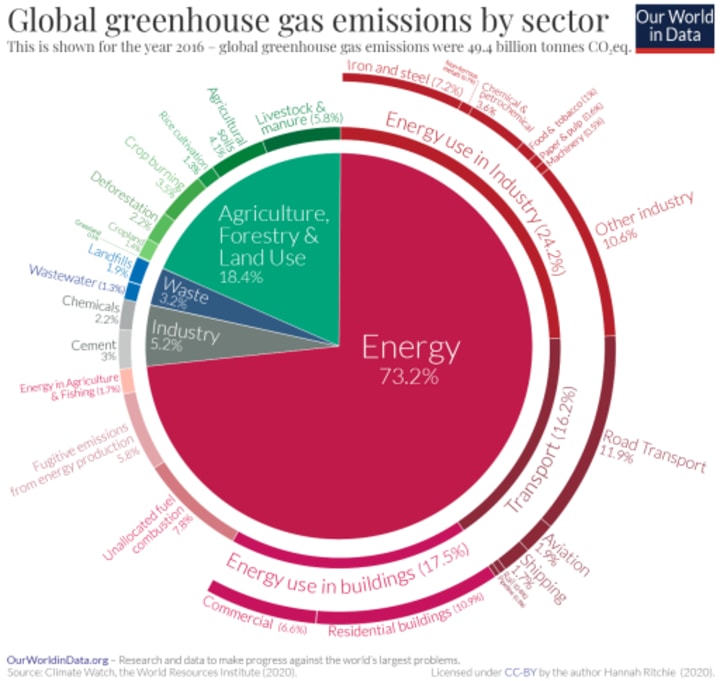Should we stop flying to help save the environment?
Yes, we should. Just look at the carbon emissions of air travel.

Note: Before offering my argument, this piece has a backstory.
In August 2021, I submitted a job application to an online education company. Part of the application required that I write a short, persuasive essay about a topic of my choosing. The idea was that with this essay in hand, the company would be able to determine my ability to advance debate topics in the form of writing.
As I considered what to write about, the topic of air travel was fresh on my mind. Recent conversations with a zero-flight friend had made me aware of the subject, followed by a deep dive into the troubling truth of frequent flying. These steps galvanized me to reconsider my stance on international travel for the sake of travel.

To prepare for the essay, which had a strict 500-word limit, I poured through a dozen articles with useful information, eye-opening statistics, and future climate predictions. Then, before uploading my documents, two writer friends agreed to review the essay. In addition to highlighting words to trim, they pointed out areas that could use strengthening.
Without them, I wouldn’t have been able to apply those sweet finishing touches that every piece deserves.
PROMPT
Should frequent fliers adopt a flight-free lifestyle to reduce their carbon emissions?
POSITION
Yes, frequent fliers should go flight-free to reduce emissions.

ESSAY
Aviation, a miracle of human ingenuity, prevents us with an inconvenient truth: Per mile, it is the most significant source of travel pollution. Yet, airlines expect to greet 8 billion passengers annually by 2036, doubling 2019’s figure. As consumers become aware of the consequences of flying, some have chosen to eliminate flying altogether. Spurring this movement are two facts: the planet is in a climate crisis, and humankind still emits too much carbon dioxide.
In the face of accelerating climate change and bleak predictions for the future, people should adopt a flight-free lifestyle.
Anna Hughes, director of a flight-free organization in the UK, says, “The more you understand about the climate impact of flying, the more you feel guilty whenever you get on a plane.” A traveler, for example, would have to recycle diligently for four years to offset emissions from a round-trip flight between New York City and Chicago. One transatlantic journey would require two or more years of strict veganism.
While aviation accounts for just 2-3% of human CO2 and 5% of global warming, a small minority of frequent flyers contribute to a disproportionately large share of emissions. To meet emissions goals and stave off widespread climate catastrophe, people will have to reduce their footprint by 45% compared to 2010 levels. Flying crushes the feasibility of accomplishing this benchmark, meaning that significant changes in travel behavior are needed.
Critics argue that eliminating air travel is impossible in the modern world, but the reality is that many people have found ways around airports. Local travel, remote events via the Internet, home theaters, Zoom, and virtual reality have emerged as sustainable alternatives. Grounded life during COVID-19 taught us to seek novelty outside of international travel. Travelers who have forgone flights in favor of trains and buses have reported more meaningful experiences.

Others contend that purchasing carbon offsets is an effective method to reduce emissions. Unfortunately, studies show that offsetting projects are far from perfect, with no guarantees to negate emissions. Offsetting operates mainly as a “guilt-free” pass for individuals and companies alike.
Although advances in “green fuel” and electric batteries show promise, these technologies will only make slight dents in the growing carbon cloud. Moreover, though widely discussed, carbon taxation and tolls remain novel, unproven concepts.
Others dispute that individual action can catalyze substantive change. Yet, frustrated citizens are not waiting for their governments to take the initiative. Worldwide, millions of people march in protest and lobby politicians to take carbon reduction seriously. Support for net-zero heroes like Greta Thunberg indicates this movement is global.
A warming planet and more extreme weather will eventually force governments to act in drastic ways. But, before it’s too late, individuals can quash their carbon emissions by going flight-free. As a traveler who has flown internationally many times in recent years, I’m ready to reduce my footprint by joining a growing number of people who eliminate air travel. Are you?
~
Sources:
2. Should we give up flying for the sake of the climate?
3. Why ‘flight shame’ is making people swap planes for trains
4. Climate change ‘may curb growth in UK flying’
5. If you care about your impact on the planet, you should stop flying
6. Why We Decided to Stop Flying & Why You Should Think About It too
8. Rethinking travel in a post-pandemic world
11. Climate Change Is a ‘Hammer Hitting Us on the Head,’ Developing Nations Say
About the Creator
Pohai Müller
I believe we’re only as old as we feel, and that each person has a story to tell.
Swiss-American, currently based in Northern Michigan.
Portfolio... pohaimuller.com
Blog......... pohaimuller.wordpress.com






Comments
There are no comments for this story
Be the first to respond and start the conversation.